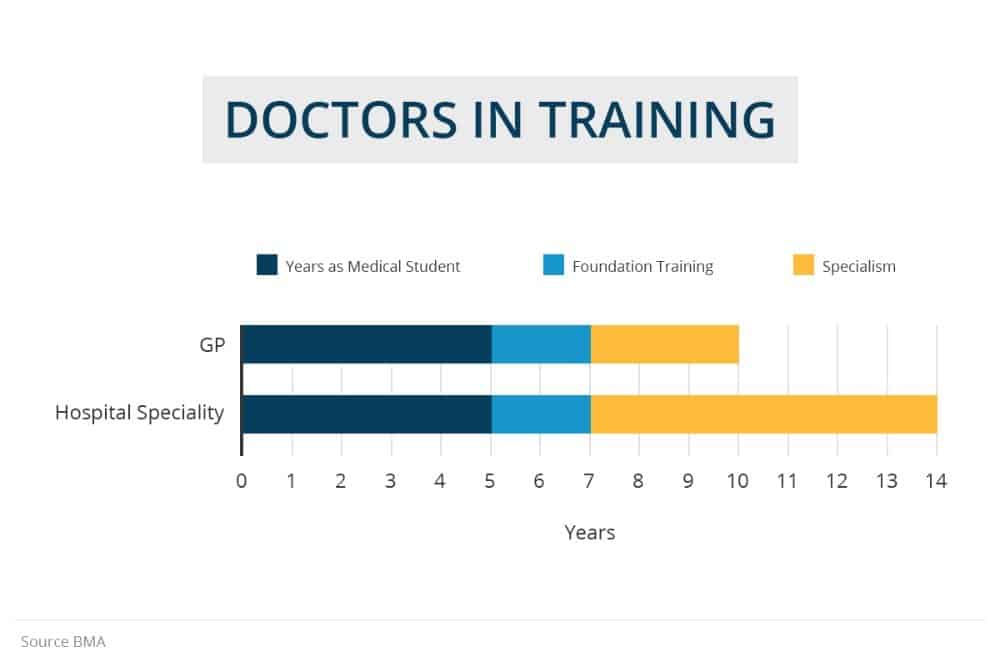How to Choose a Medical Specialty

What is a Medical Specialty?
There are countless different types of doctors and specialties. A speciality is a field of medical practice focused on a particular group of patients, diseases, skills, or philosophy. There are dozens of specialties, with some offering the chance for further training in a sub-specialty. Medical specialties are generally categorised according to the following different criteria:
- Surgical or internal medicine
- The age range of patients
- Diagnostic or therapeutic
- Organ-based or technique-based
Do You Have To Select A Speciality?
In the UK, you can choose to undertake specialty training or to become a General Practitioner (GP). Unlike specialists, GPs treat all common medical conditions and refer patients on for specialised treatment. At just three years, GP training is shorter than most medical specialties.
When Do You Select Your Medical Specialty?
In the UK, trainee doctors apply for speciality training upon completion of the Foundation Programme. The Foundation Programme is a two-year programme in which you spend a few months trying out different specialities. You can learn more about what is involved in Foundation Training, in our blog “How To Become A Doctor in the UK: A Step-By-Step Guide.”
10 Questions to Ask Yourself Before Choosing A Medical Specialty
- Do I have the relevant skills, training and experience?
- Am I interested enough in the speciality to get sufficient job satisfaction?
- What level of work-life balance do I want?
- How many years am I willing to train for?
- Do I perform well in high-pressure situations?
- Do you prefer variety or routine?
- How far do I want to climb in my career and how far can I progress in the specialty?
- Would I prefer to have a lot or just a little patient contact?
- Do I prefer to work by yourself or as part of a team?
- Do I enjoy problem-solving or do I prefer straightforward care practices and structured work?

How To Choose A Medical Specialty: Our Top Tips
With over 60 specialties and 30 subspecialties to choose from, selecting a specialisation can be a tough choice. Try not to rush into making a decision, take as much time as you need to conduct research and assess your options. If need be, take some time out after Foundation training to gain extra experience so you can make a more informed decision.
There are a number of factors you will need to consider when trying to identify the right path for you. Consider your preferences and skills and reflect on your professional ambitions. You should also meditate on how you would like your work to fit around your lifestyle, so be sure to look into the on-call commitment for different specialties. You can also find helpful information about competitiveness and salary online.
You will need to process lots of information before deciding what kind of doctor you want to be. Fortunately, there are many sources from which you can gain valuable career advice. Your first port of call should be the internet. Following that, try to speak to a practitioner in the field to get the insider’s scoop. You can also get good advice from the postgraduate deaneries or the appropriate royal college.
What is The Application Process for Medical Specialties in the UK?
The training and registration for each specialty are managed by the relevant royal college. To apply for a specialty, you will need to fill out a form as part of your application detailing your education and previous experience. If you make the shortlist, you will be asked to attend an interview. Bear in mind that entry to some specialties is fiercely competitive. You can view the competition ratios for each speciality online to see how many applications are submitted against available training posts each year.
How Long Does It Take to Complete A Specialty?
The length of time it takes to complete a specialty depends on the complexity of the programme you choose. Once you have completed the training, you can become a consultant.
In the UK
GP specialty training currently takes three years. However, this is under review and it will more than likely be extended to four years in the future. The length of training for other specialties can vary between five to eight years depending on the complexity of the programme.
 In Europe
In Europe
If you decide to study your specialisation in a Ukrainian or Georgian medical university, you can expect training to last between two to six years. Again, the length of the programme will depend on the specialty you choose.
Can You Specialise Abroad?
Most European universities accept international graduates into their medical specialisation courses. There are many reasons why you may choose to study a medical specialty abroad. Firstly, as the tuition fees are much lower you can leave university without the burden of debt holding you down. What’s more, opening yourself up to the possibility of studying in Europe means that you have more universities to choose from and a much higher chance of securing a spot in a prestigious medical school.
If you are interested in pursuing a medical specialty abroad but don’t know where to start, you can talk to Study Medicine Europe. We currently offer students the chance to secure a place in a fully-accredited medical specialisation/residency programme in either New Vision University in Georgia or in Sumy State University in Ukraine. Click here to learn more about the vast array of programmes on offer.
What is the Difference Between A Coupled & Uncoupled Training Programme?
Specialty medical training in the UK falls into two main categories, these are:
Run-Through Programmes:
You only have to apply once for run-through programmes, and you will be employed for the full duration. Depending on the specialty, these can last between 3 -7 years. Run-through programmes cover both the early and more advanced years of specialty training.
Uncoupled Programmes:
You will initially complete core training over the course of 2- 3 years, and you will then compete for entry into higher specialty training. The vast majority of hospital physician specialties are uncoupled.
A List of The Different Types of Doctors & Medical Specialties
| Allergy & Immunology | Treatment of patients suffering from allergies and diseases of the respiratory tract or immune system. |
| Anaesthesia | Doctors who administer anaesthesia for pain relief during surgical and medical procedures. |
| Cardiology | Treatment of patients suffering from diseases of the heart and circulatory system. |
| Dermatology | Diagnosis and treatment of conditions of the skin as well as hair and nails. |
| Emergency Medicine | A wide-ranging specialty covering the provision of care for patients in emergency situations. |
| Endocrinology | Deals with conditions relating to the endocrine system e.g. Diabetes and thyroid disease. |
| Gastroenterology | Diagnosis and treatment of all gastrointestinal (stomach and intestines) and hepatological (liver, gallbladder, biliary tree and pancreas) disorders. |
| Infectious Diseases | Deals with infectious conditions caused by bacteria, viruses, and fungi such as HIV and pneumonia. |
| Neurology | Studies and treats conditions affecting the nervous system including the brain, spinal cord, muscles, autonomic nervous system, and blood vessels. |
| Obstetrics & Gynaecology | Obstetrics refers to the care of pregnant women and unborn children. Whereas, Gynaecology is primarily concerned with the female reproductive organs. |
| Ophthalmology | Treatment of vision problems by providing medical and surgical treatment of the eyes. |
| Occupational Medicine | Deals with diseases and conditions caused by or worsened by the workplace environment. |
| Paediatrics | Diagnosis and treatment of infants, toddlers, children and teenagers. |
| Pathology | A multidisciplinary specialty studying the causes of diseases and the changes in body tissues and organs brought about by diseases. Sub-specialties include Chemical pathology, Haematology, Histopathology, Medical microbiology and virology. |
| Psychiatry | Diagnoses, treats and manages patients with mental and emotional disorders. Sub-specialties include child and adolescent psychiatry, forensic psychiatry, general psychiatry, medical psychotherapy, old age psychiatry, and psychiatry of intellectual disability. |
| Public Health | Study the health of communities rather than individuals. They work to deliver Public Health Programmes aiming to improve and protect the health of populations. |
| Radiology | Specialises in the use of tools (e.g. x-rays, MRIs & ultrasound) to detect certain diseases such as Cancer. |
| Rehabilitation Medicine | Works with patients suffering from physical impairments or disabilities to recover their functional ability and enhance their quality of life. |
| Rheumatology | Diagnoses, treats and manages rheumatic diseases, or conditions of the musculoskeletal system such as arthritis, osteoarthritis, and back problems. |





















